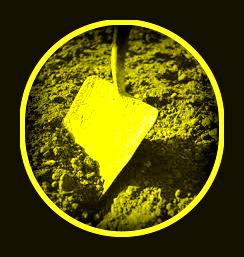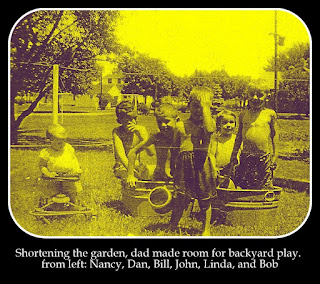 I/we (Kerbers) call it “dad’s garden” because he tilled, planted, weeded, and protected it from both insect pests and from kids’ feet chasing after errant plastic whiffle balls. He nurtured it until it was ready for harvest. And while he would bring in a few radishes or a fallen tomato, he didn’t really harvest it. That was mom’s job. Or, I should say, it was her job to wrangle us kids into doing the picking and then help her with the canning.
I/we (Kerbers) call it “dad’s garden” because he tilled, planted, weeded, and protected it from both insect pests and from kids’ feet chasing after errant plastic whiffle balls. He nurtured it until it was ready for harvest. And while he would bring in a few radishes or a fallen tomato, he didn’t really harvest it. That was mom’s job. Or, I should say, it was her job to wrangle us kids into doing the picking and then help her with the canning. Dad’s garden is an important north star for us Kerbers. It is an embodiment of much of our make-up, an intrinsic part of who we are. We hold the image of their garden fondly inside ourselves. It is a thing that brings dad, and also mom, into sharper focus.
When mom and dad bought 828 Spruce Street in 1950, most of the large back yard was garden. For the first couple of years, dad tried to plant all of it. His brother owned a greenhouse and tilled our garden with a tractor and plow. It didn’t take but two seasons for them to realize the garden was too big for the lot and (maybe) not yet enough kids for the harvest. Plus, the kids that were needed room to play, so dad shortened the garden by a third. Then, a few years later, mom and dad realized us kids needed more room, especially for a plastic whiffle-ball park, so he shortened it by another third. The lesson I take away from this is one of balance – kids need a place to play as well as food.

It was after this last shortening that dad looked offsite for more gardening space, finding it first at his mother’s house, then at a friend’s house two streets over, and later in a vacant lot across town
After the first shortening of the garden, the tractor and plow became impractical, so dad spaded it shovelful by shovelful. Those shoveled clumps needed busting up with a hoe and smoothing with a rake. Dad usually had one of us boys helping him with this. It
usually wasn’t a bad job (for me) because it meant doing something with dad in the cooler evening air after supper.


 Dad planted everything himself, using a string to align the rows. After the little plants shot up, it was time for hoeing. He explained to me that hoeing was both to remove weeds and to help keep the soil moist, by breaking up cracks and holes in the soil that tended to dry the upper layer. I believe hoeing was a kind of meditation for dad, and a way for decompressing after work, grabbing a hoe and heading to the garden before going into the house.
Dad planted everything himself, using a string to align the rows. After the little plants shot up, it was time for hoeing. He explained to me that hoeing was both to remove weeds and to help keep the soil moist, by breaking up cracks and holes in the soil that tended to dry the upper layer. I believe hoeing was a kind of meditation for dad, and a way for decompressing after work, grabbing a hoe and heading to the garden before going into the house. It was only much later after leaving home and planting a garden of my own and canning and freezing the output that I realized the greenness of dad’s thumb and the organizing ability of mom. To me, the harvest they achieved from two gardens was a wonder of nature. How they produced so much from so small an acreage is a mystery – 150 quarts of beans, 150 quarts of tomatoes and 75 of juice, plus tomato catsup some years and 25 pints of chili sauce. All of this on top of what we ate all summer long.
The best harvest that I achieved from my early gardening and canning was a realization of the thought, work, and (dare I say) love dad and mom put in to the yearly need to stock up. Remembering their garden is a compass point that brings me back to mom and dad. It reminds me of their effort to raise up us kids to become not flowers, but hardy, purposeful plants.

-- Bob














